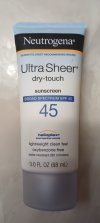Laurie, the article seems to have been written five years ago. Possibly there is even more and newer information since then to confuse us further.

P.S. I see the article
@trecile has just posted is from less than a week ago, with new info.

Yes, the article is old but the podcast is from last week.
More reading on sunscreen
Chemical sunscreens are not *less safe* than mineral sunscreens. Disinformation about sunscreen safety is a public health issue.

immunologic.substack.com
I know that this is the standard US dermatological response.
There are really two issues here, which I have conflated and will try to separate.
Number One. Does sunscreen with oxybenzone cause cancer? The standard dermatological community response in the US is no. I know some at my university doing research on carcinogens generally who believe we are being too flippant by just saying that oxybenzone and octinoxate are safe. The web is full of reasonable people who say the same thing, that there are real health impacts. Hawaii has banned the sale of it because it kills coral reefs and other marine life. I use sunscreen, but try not to use the standard ones with those chemicals.
Number Two. Does over-use of sunscreen lead to a Vitamin D deficiency? The podcast I’ve linked to above, which is LONG, is an interview with a respected Scottish dermatologist, Dr. Richard Weller, who has been arguing for years and years that we need to do more research to examine whether the extremely serious downsides of a Vitamin D deficit (caused by too little sun exposure and not remedied by taking Vitamin D pills) are being ignored in part because of the “stay out of the sun because of sun cancer” bandwagon. He describes some studies (caveat, they are done in northern Europe where sun exposure is much less, so he is not saying what he found is true for the US), and his point is that because there is a wall of resistance to any studies that might cast doubt on the use of sunscreen, we just don’t have good evidence in the US. I am not a scientist, have a terrible scientific deficit, but listening to this radio show while I was making dinner on Sunday convinced me that this is a serious issue that should be studied.
If you’re interested but don’t want to listen to an hour long conversation, you can find lots of shorter snippets on the web, including a TED talk, by searching with “vitamin D” and “Richard Weller.”

















